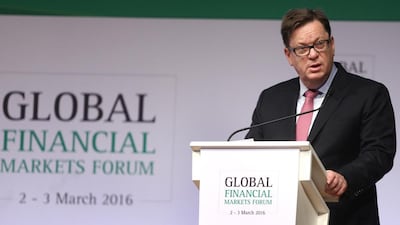Mahmoud Kassem
National Bank of Abu Dhabi is keen to help fill a US$260 billion funding gap for small and medium-sized enterprises in the Middle East even as many banks step back from the risky business of funding them, said its chief executive Alex Thursby.
But Mr Thursby also expressed concern that governments, in their efforts to introduce more regulations to avoid a repeat of the 2008 financial crash, have erected too many barriers to wealth creation.
“Policymakers in the financial industry as a whole must nurture the entrepreneurism of our small to medium-sized businesses,” he said yesterday at a financial conference organised by the bank in Abu Dhabi.
“SMEs in today’s world must become the growth engine of our economies, and we need to give them access to capital, provide them with tools to enhance their potential and not burden them with excessive or unnecessary regulations.”
Mr Thursby noted that SMEs account for about 60 per cent of GDP in the region, a rate that is higher than more developed Europe, the US and Asia, where that figure ranges between 40 and 50 per cent of GDP
NBAD’s push, however, comes at a time of increasing stress for SMEs, usually among the first casualties of a slowing economy.
According to a survey in November by Gulf Finance, the SME lending arm of the Dubai-based investment bank Shuaa Capital, small businesses are increasingly pessimistic about the outlook for growth as oil prices remain unusually low.
But NBAD is a relative newcomer to the field of SME lending and has not borne too much of the brunt from the fallout over the past year, during which many SMEs have folded.
Abdul Aziz Al Ghurair, the chairman of the UAE Banking Federation, said in November that a number of small business owners might have fled the country, leaving unsettled debts of about Dh5 billion.
Mr Thursby, however, is not discouraged by the downturn for SMEs and is pressing on with the bank’s efforts to become more entrenched in the business of lending to them, as well as helping to create suitable candidates for financing.
In the second half of last year, the bank put more than 100 business owners through courses using help from institutions including Moody’s and the Dubai-based corporate governance institute Hawkamah to help SMEs get a better grip on managing finances. It is aiming this year to train 250 businessmen and women and 600 SME owners.
UAE government officials have been counting on small businesses to play a key role in the development of the economy. SMEs account for 86 per cent of the workforce in the private sector, according to the Ministry of Economy, while 300,000 companies can be classified as part of the sector.
mkassem@thenational.ae
Follow The National's Business section on Twitter

